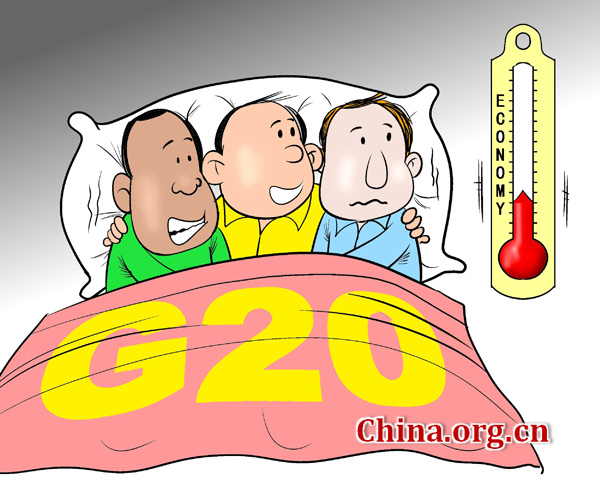Successes of China's economic diplomacy
- By John Ross
 0 Comment(s)
0 Comment(s) Print
Print E-mail China.org.cn, November 17, 2014
E-mail China.org.cn, November 17, 2014
|
[By Jiao Haiyang/China.org.cn] |
This creates a rather bitter political atmosphere in the G7. Recent U.S. polls found 65 percent of the U.S. population believed future generations would be worse off than the present one and respect for U.S. political institutions is at record lows – only 13 percent believed the government could be trusted to do the right things most of the time. A further poll found only 33 percent believed the United States was going in the right direction, while 62 percent believed it was going in the wrong one. In the United States there is standoff between the Democratic president and the now wholly Republican controlled Congress. Europe has seen a rise of racist right wing parties, such as the Front National in France, and separatist and independentist movements.
In some developing countries slow global economic growth has turned into something worse than sour political moods – social dislocation and armed conflict. An arc of instability, ranging from serious terrorism to full scale civil war, stretches from West Africa through large parts of North Africa (Libya, Egypt), into parts of western and central Asia (Syria, Iraq, Yemen, Afghanistan and parts of Pakistan). To the north west of this arc is civil war in Ukraine.
The Pew Research Center survey found that, among the largest economies, China remains the exception – 87 percent in China were "satisfied with the way things are going in our country." There have been terrorist incidents, particularly linked to Xinjiang in western China, but these are very small compared to the situation in Africa and other parts of Asia.
The correlations between economic developments, public moods and social stability are rational. Pew's research showed almost two thirds of the economic optimism or pessimism in a country is accounted for by how fast its economy is growing. The difference in mood between China and the United States is easily explained by the fact that in the year to the third quarter of 2014, China's economy was growing more than three times as fast as the United States.
Against this background, the initiatives China promoted at both APEC summit and G20 summits were important not only for China but for the global economy. China's growth is not yet sufficient to determine the situation in the G7 economies, but it now strongly influences the situation in developing economies. Overall China's growth will aid the situation in Africa and Latin America – the majority of China's trade is now with developing countries. But China's economic impact, and the area where it can take the most direct initiatives, is in Asia – which, as already seen, is also the core region for maintaining global growth.
By itself China is the world's second largest economy after the United States, measured at market prices. Calculated in Purchasing Power Parity (PPP), as many Western economists prefer, China's is now the world's largest economy by World Bank estimates. Even at market prices China's contribution to world economic growth last year, US$1,038 billion, was almost twice the United States' $555 billion. China is the largest trading partner of the majority of Asian countries.
Considering the next 10-20 years, the largest economy in Asia after China will be India. India's economy is already larger than Japan by PPP measures, and given their relative growth rates, it is purely a matter of time before India's economy also overtakes Japan at market exchange rates. China is already India's largest trade partner. China and India together constitute the biggest potential for rapid growth by major economies.
But a decisive challenge holding India back is lack of infrastructure. This creates the basis for one of the world's most potentially fruitful economic relations. China can supply finance and contracting companies for significant parts of the infrastructure India needs. It is for this reason that India refused to accede to U.S. objections and decided to become a founding member of the Asian Infrastructure Investment Bank (AIIB) supported by China.







Go to Forum >>0 Comment(s)